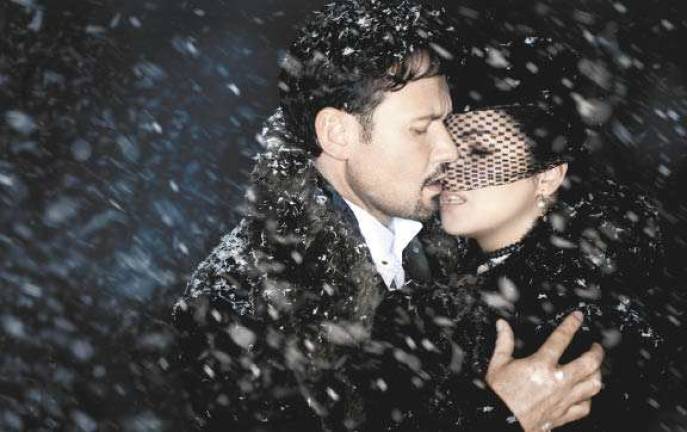Standards, Met and Unmet

A Tchaikovskymasterpiece at the Metand a classic movie
In a fall preview last month, I made a point about Valery Gergiev, the Russian conductor: He is mercurial. Sometimes he's up, sometimes he's down. Sometimes he's electric, sometimes he's blah. On a recent Thursday night at the Metropolitan Opera, he was alternately electric and blah. He was conducting a Tchaikovsky masterpiece, Eugene Onegin.
He can conduct the chorus and dance in Act I so that you can barely sit in your seat-that's how exciting it is. But on this occasion, no. It's as though he decided to withhold the electricity. Other parts of the opera were exciting, mesmerizing or other desirable things. The music ran out of gas at the end, which is a bad time to run out of gas.
Gergiev is an interesting and mysterious cat. Sitting there, I thought, "It's hard enough being a music critic without being a shrink as well."
The Met orchestra played responsively and admirably. This was especially true of the woodwinds, to whom Tchaikovsky is so kind. Stefán Höskuldsson, the flute; Elaine Douvas, the oboe; Anthony McGill, the clarinetist-they were all first-rate. So was Joseph Anderer, the French horn. In the Letter Scene and elsewhere, he played with extraordinary accuracy. French hornists are born to stumble. They have a right to do so. If Anderer keeps this up, they'll kick him out of the horn union.
In the leading male roles were two Poles: Mariusz Kwiecien, the baritone, who sang Onegin, and Piotr Beczala, the tenor, who sang Lenski. Kwiecien was sleek and assured, as usual. His insouciance toward Tatiana was just right. But, particularly in the final scene, he lacked a certain heft, both vocally and theatrically. Beczala had a magnificent night, a supercharged night. He was booming it out there like Bjoerling. His natural likability made Lenski more likable than ever, and acutely tragic. Also, Beczala took great pleasure in his singing-and it can be quite pleasurable to hear another take pleasure in his own singing.
This opera has three mezzo-sopranos, the leading one of whom sings Olga, Tatiana's younger sister. At the Met, she was Oksana Volkova, who was adequate. Elena Zaremba and Larissa Diadkova are former Olgas, seasoned pros, who at the Met were Madame Larina and the Nurse, respectively. They were wise and glorious, giving lessons in Russian opera singing.
Ferruccio Furlanetto, the Italian bass, once told me that Prince Gremin in Onegin is just about the best role in opera: You play golf in the afternoon; you have a nice dinner; you arrive at the opera house during the second intermission; you sing the best aria in the opera, stealing the show; you get the girl; you go home with a healthy check. Nice work if you can get it. Alexei Tanovitski got it here, and performed serviceably.
The Met's production is a new one, under the care of Deborah Warner. It replaces one of the finest productions in the Met cupboard, the 1997 Onegin by Robert Carsen. The new one is unobjectionable at worst, satisfying at best. A successful small touch, I think, is the handshake and hug that Onegin gives Lenski before the duel. Less successful, I think, is the long smooch that Tatiana plants on Onegin at the end. It's a little gimmicky and suspends the opera, marring Tchaikovsky's pacing.
Speaking of Tatiana, she was Anna Netrebko, possibly the starriest soprano of the last ten years. I have written many thousands of words about her, and will now confine myself to a few: She has the gift of knowing-how to phrase, how to apply dynamics, how to put across a character. I have no idea what she would score on an SAT test. But, as an opera performer, she's an Einstein.
Over at Avery Fisher Hall, the New York Philharmonic did something fun: They played the soundtrack of 2001: A Space Odyssey, as the movie unspooled on a big screen overhead. Everyone knows that Richard Strauss's Also sprach Zarathustra is used in this movie. Actually, people refer to this music as "2001." But there are also pieces by Johann Strauss the Younger, Aram Khachaturian and György Ligeti.
On the night I attended, the Philharmonic, under Alan Gilbert, did not come off as a top orchestra. (There were two screenings, of which I caught the first.) They came off as a perfectly good orchestra. Entrances were okay, sound was okay (mainly), musical spirit was okay (sort of). There was some lovely unison cello playing in the Khachaturian bit from Gayane. But there was not a lot else to commend. The Danube waltz was downright uncommendable-having little grace, little beauty, little of Vienna. It was good enough for government work, maybe. But for a top orchestra?
Perhaps these forces were doing their very best on this night. Perhaps not. New Yorkers are loyal to their orchestra, and the Philharmonic will probably win applause and praise no matter what. So it's all the more incumbent on players to meet high standards, just because.